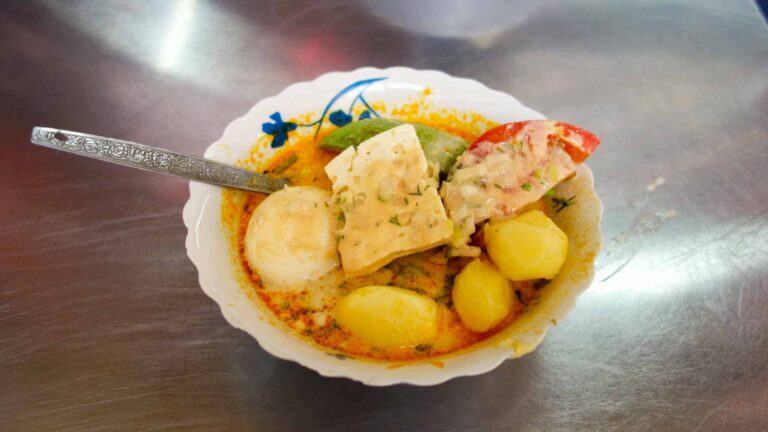Introduction: Ecuadorian Cuisine
Ecuadorian cuisine is characterized by its diversity and richness, resulting from the country’s unique geography, climate, and cultural influences. Ecuadorian food has gained recognition and popularity worldwide for its delicious taste and unique flavors, reflecting the country’s history, traditions, and culture. Ecuadorian cuisine is a fusion of indigenous, Spanish, and African culinary traditions, resulting in a range of dishes that vary from region to region.
Food and Identity in Ecuadorian Culture
Food is an essential part of Ecuadorian culture, as it reflects the country’s identity, traditions, and values. Ecuadorians take pride in their cuisine and believe that it represents their cultural heritage and diversity. Food is a way of expressing love, gratitude, and hospitality, and it is often used to bring people together and celebrate life’s special moments, such as weddings, birthdays, and religious festivals. Ecuadorian food is not only a source of nourishment, but it is also an expression of cultural identity and a way of preserving traditions for future generations.
The Historical Roots of Ecuadorian Cuisine
Ecuadorian cuisine has a rich history that dates back thousands of years. The country’s indigenous people, such as the Inca, the Quechua, and the Shuar, had a profound influence on the local cuisine, introducing a variety of ingredients and cooking techniques that are still used today. When the Spanish conquered Ecuador in the 16th century, they brought with them new ingredients and cooking methods, such as wheat, rice, and meat. African slaves also contributed to Ecuadorian cuisine, introducing new spices and flavors. The result was a unique fusion of indigenous, Spanish, and African culinary traditions that define Ecuadorian food today.
Indigenous Ingredients That Define Ecuadorian Food
Ecuadorian cuisine is known for its use of indigenous ingredients that give the food its distinct flavor and character. Some of the most commonly used ingredients in Ecuadorian food include potatoes, corn, quinoa, yucca, beans, and a variety of fruits and vegetables. Ecuadorian cuisine also features a range of exotic ingredients, such as guinea pig, which is considered a delicacy in the Andean region. Indigenous ingredients are not only important for their flavor, but they also have cultural and symbolic significance, representing the country’s history and traditions.
The Role of Food in Ecuadorian Festivals and Celebrations
Food plays a central role in Ecuadorian festivals and celebrations, where it is used to bring people together and celebrate life’s special moments. One of the most significant festivals in Ecuador is Inti Raymi, also known as the Festival of the Sun, which celebrates the winter solstice. During this festival, people prepare traditional dishes such as roasted pork, corn bread, and chicha (corn beer) to share with their families and friends. Another important festival is the Day of the Dead, where families gather to prepare traditional foods such as colada morada (a thick purple corn drink) and guaguas de pan (bread shaped like babies). Food is not only a source of nourishment during festivals and celebrations, but it also serves as a way of connecting with one’s cultural heritage and preserving traditions.
Traditional Ecuadorian Dishes and Their Symbolic Meaning
Traditional Ecuadorian dishes have a symbolic meaning that reflects the country’s cultural heritage and values. For example, ceviche, a seafood dish made with lime juice and onions, represents the country’s coastal region and its abundance of fresh seafood. Fanesca, a thick soup made with grains and dried fish, is traditionally served during Holy Week and represents the country’s religious and cultural traditions. Empanadas, a popular street food, is a symbol of Ecuadorian hospitality and generosity, as people often prepare them to share with their neighbors and friends. Each dish has a story and a cultural significance that reflects the country’s unique identity and heritage.
Food as a Tool for Social Cohesion in Ecuadorian Society
Food is not only important for its cultural and symbolic significance, but it is also a tool for social cohesion in Ecuadorian society. Eating together is a way of building relationships and strengthening social bonds, and it is often used to resolve conflicts and promote harmony. Ecuadorian food is also an important source of employment and income, as many people work in the food industry, from farmers and fishermen to chefs and restaurant owners. Food is a way of bringing people together and promoting social and economic development in Ecuadorian society.
Conclusion: The Cultural Significance of Ecuadorian Food
Ecuadorian food is more than just a source of nourishment; it is a reflection of the country’s cultural, social, and economic identity. From its indigenous ingredients and historical roots to its symbolic meaning and role in festivals and celebrations, Ecuadorian food is a testament to the country’s rich and diverse cultural heritage. Food is a way of preserving traditions, building relationships, and promoting social and economic development in Ecuadorian society. Whether you’re trying ceviche on the coast or fanesca in the Andes, Ecuadorian cuisine is a unique and delicious way of experiencing the country’s culture and identity.

